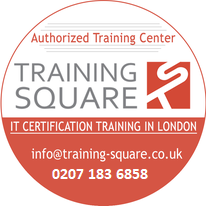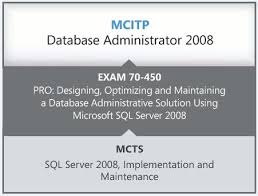MCITP SQL 2008 Certification
The Microsoft Certified IT Professional (MCITP) certification for SQL Server 2008 is a credential designed to validate the skills and expertise of IT professionals in implementing, administering, and managing SQL Server 2008 databases and related technologies. This certification is specifically targeted at individuals who work with SQL Server 2008 in enterprise environments and covers various aspects of database administration, development, and business intelligence (BI) development. Key highlights of the MCITP SQL Server 2008 certification include: Database Administration: The certification focuses on database administration tasks, including installing, configuring, and maintaining SQL Server 2008 instances and databases. It covers topics such as managing database storage, implementing security measures, performing backups and restores, and monitoring and optimizing database performance. Database Development: It also includes topics related to database development, such as designing and implementing database objects (tables, views, indexes, stored procedures, functions) and writing and optimizing SQL queries to retrieve and manipulate data efficiently. Business Intelligence Development: The certification may include components related to business intelligence (BI) development, covering tools and technologies such as SQL Server Integration Services (SSIS) for ETL (extract, transform, load) processes, SQL Server Analysis Services (SSAS) for multidimensional data modeling and analysis, and SQL Server Reporting Services (SSRS) for designing and deploying reports and dashboards.
Overview
The Microsoft Certified IT Professional (MCITP) certification for SQL Server 2008 is a comprehensive credential designed to validate the skills and expertise of IT professionals who work with Microsoft SQL Server 2008, a leading relational database management system (RDBMS) widely used in enterprise environments. This certification program is aimed at individuals who perform various roles related to SQL Server 2008, including database administration, database development, and business intelligence (BI) development.
The MCITP SQL Server 2008 certification encompasses a broad range of topics and skills, covering both technical and practical aspects of working with SQL Server 2008 and related technologies. Key components of the certification include:
- Database Administration: The certification focuses on database administration tasks, which involve the installation, configuration, maintenance, and security of SQL Server 2008 instances and databases. Database administrators (DBAs) are responsible for ensuring the availability, reliability, and performance of databases, as well as implementing security measures to protect sensitive data. The certification covers topics such as:
- Installing and configuring SQL Server 2008 instances and databases.
- Managing database storage, including filegroups, files, and disks.
- Implementing security measures, including authentication, authorization, encryption, and auditing.
- Performing database backups and restores to ensure data protection and disaster recovery.
- Monitoring and optimizing database performance using tools and techniques such as query tuning, index optimization, and performance monitoring.
- Database Development: In addition to database administration, the MCITP SQL Server 2008 certification program includes topics related to database development. Database developers are responsible for designing, implementing, and optimizing database objects and queries to support applications and meet business requirements. The certification covers topics such as:
- Designing and implementing database objects, including tables, views, indexes, stored procedures, and functions.
- Writing and optimizing SQL queries to retrieve and manipulate data efficiently.
- Implementing data integrity constraints, such as primary keys, foreign keys, and check constraints.
- Managing transactions and concurrency to ensure data consistency and integrity.
- Implementing data validation and error handling mechanisms to maintain data quality.
- Business Intelligence Development: Another important aspect of the MCITP SQL Server 2008 certification is business intelligence (BI) development. BI developers use SQL Server 2008 tools and technologies to design, implement, and deploy BI solutions that help organizations analyze and visualize data to make informed business decisions. The certification covers topics such as:
- Designing and implementing ETL (extract, transform, load) processes using SQL Server Integration Services (SSIS) to integrate data from multiple sources into a data warehouse.
- Designing and implementing multidimensional data models using SQL Server Analysis Services (SSAS) to support online analytical processing (OLAP) and data mining.
- Designing and deploying reports and dashboards using SQL Server Reporting Services (SSRS) to present data in a meaningful and interactive manner.
By earning the MCITP SQL Server 2008 certification, IT professionals demonstrate their expertise in working with SQL Server 2008 and their ability to effectively manage databases, develop database solutions, and implement BI solutions using Microsoft technologies. This certification can enhance career prospects and open up opportunities in roles such as database administrator, database developer, BI developer, data analyst, and more, in organizations that use SQL Server as their database platform. Additionally, it provides a solid foundation for further advanced certifications in SQL Server and Microsoft's data platform technologies.
- Completion Certificate
- Course Length
- Locations
- Locations
- Locations
- Locations

